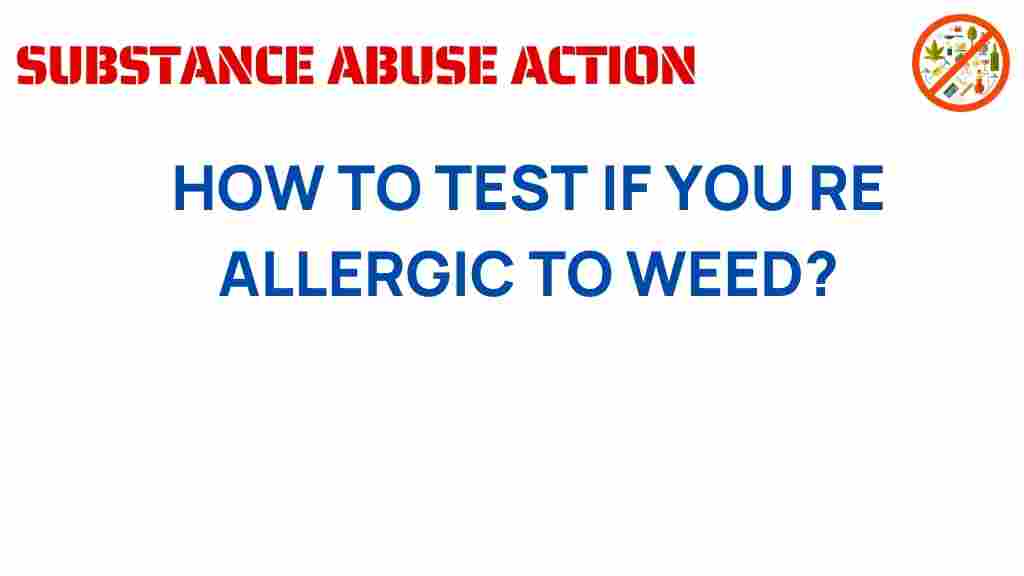Is Your Body Reacting? Signs You Might Be Allergic to Weed
As cannabis becomes more widely accepted and used for both recreational and medicinal purposes, it’s essential to consider the potential allergy risks associated with marijuana. While many people enjoy the benefits of cannabis, some may experience negative reactions that could indicate an allergy to marijuana. This article will explore the various symptoms of a marijuana allergy, how to get a proper diagnosis, and steps to take if you suspect you are allergic to cannabis.
Understanding Marijuana Allergies
Just like any other substance, marijuana can cause allergic reactions in some individuals. A cannabis allergy is a hypersensitivity to compounds found in the plant, which can lead to a range of symptoms. Awareness of these symptoms is crucial for early detection and management.
Common Symptoms of Marijuana Allergy
Symptoms of an allergy to marijuana can vary widely from person to person. Here are some of the most common signs that your body might be reacting negatively to cannabis:
- Skin Reactions: Redness, hives, or itching can occur after contact with marijuana. This might happen through handling the plant or contact with cannabis-infused products.
- Respiratory Issues: Symptoms like sneezing, nasal congestion, runny nose, or asthma-like symptoms may arise, especially in individuals who smoke or inhale cannabis.
- Gastrointestinal Symptoms: Nausea, vomiting, or diarrhea can occur in some cases, particularly if marijuana is ingested.
- Headaches: Some individuals report experiencing headaches or migraines after consuming cannabis.
- Fatigue or Drowsiness: A sudden onset of tiredness or lethargy can sometimes indicate an adverse reaction.
How to Determine if You Have a Marijuana Allergy
If you suspect that you are experiencing an allergic reaction to cannabis, it’s important to undergo proper testing and diagnosis. Here’s a step-by-step process to follow:
- Track Your Symptoms: Keep a record of when your symptoms occur, their severity, and any specific strains or products you used. This information can be helpful for your healthcare provider.
- Consult a Healthcare Professional: Schedule an appointment with a doctor or allergist who is knowledgeable about cannabis allergies. Be prepared to discuss your symptoms and history.
- Allergy Testing: Your doctor may recommend skin tests or blood tests to identify specific allergens. Skin prick tests can determine if you’re allergic to certain components of marijuana.
- Elimination Diet: If you consume edible cannabis products, your doctor may suggest an elimination diet to see if symptoms improve when you stop consuming cannabis.
Potential Side Effects of Marijuana
Even if you do not have a full-blown allergy, marijuana can cause a range of side effects that might mimic allergic reactions. Some of these side effects include:
- Dizziness: Some users may feel lightheaded or dizzy after consuming cannabis.
- Increased Heart Rate: Cannabis can lead to tachycardia in some individuals, which is an increase in heart rate.
- Mental Changes: Anxiety, paranoia, or altered perception may occur, especially in first-time users or those who consume high doses.
Diagnosing Marijuana Allergies
Diagnosis of a marijuana allergy involves a comprehensive approach that includes a detailed medical history, physical examination, and possibly allergy testing. Your healthcare provider may also ask about:
- Your history of allergies (e.g., pollen, dust mites, pet dander).
- Other health conditions you may have (e.g., asthma, eczema).
- Any medications you are currently taking.
In some cases, an allergist may recommend a controlled exposure to marijuana under medical supervision to monitor for reactions. This should only be done in a safe environment due to the risk of severe allergic responses.
Troubleshooting Tips for Managing Marijuana Allergies
If you find that you have a marijuana allergy, it’s crucial to take steps to manage your health and avoid future reactions. Here are some tips:
- Avoid Exposure: The most effective way to manage a marijuana allergy is to avoid all forms of cannabis, including smoking, edibles, and topical products.
- Inform Others: Make sure friends and family are aware of your allergy, especially in social situations where cannabis might be present.
- Carry Allergy Medication: If prescribed, carry antihistamines or an epinephrine auto-injector (EpiPen) in case of accidental exposure.
- Seek Alternative Treatments: If you use cannabis for medicinal purposes, consult with your healthcare provider about alternative treatments that do not trigger your allergy.
Increasing Awareness About Cannabis Allergies
As the use of cannabis becomes more mainstream, the need for increased awareness about the potential for allergies is vital. Patients, healthcare providers, and the cannabis industry should all work together to promote understanding and support for those affected by cannabis allergies.
For further reading on the effects of marijuana and its components, you can check out this external resource that provides comprehensive information about cannabis.
Conclusion
Being aware of the possibility of a marijuana allergy is crucial for anyone who uses cannabis. Recognizing the symptoms, understanding the diagnosis process, and knowing how to manage reactions can significantly improve your health and quality of life. If you suspect you are allergic to marijuana, don’t hesitate to consult with a healthcare professional for guidance and support.
For more information on allergies and health awareness, feel free to visit our internal resource page.
This article is in the category Health and created by SubstanceAbuseAction Team
